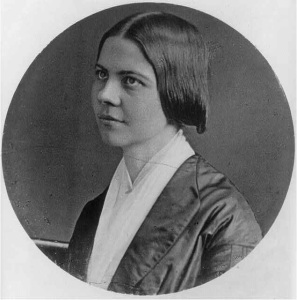The 1855 Prenup for Women’s Rights

In most mid-nineteenth-century American states, a married woman had little legal standing. For starters, she didn’t have the right to use her own name, as her identity was subsumed under her husband’s in the eyes of the law. Once married, her betrothed could rent or sell any land she owned, and she could not purchase new property because wives were forbidden from signing legal contracts.
So in 1855, one Massachusetts couple used their wedding ceremony as the stage for a dramatic public demonstration against the patriarchal property laws of the day. Standing together before their guests, Lucy Stone and Henry Blackwell read a prenuptial agreement they had written and signed strongly opposing these misogynistic edicts.
Furthermore, they vowed to resolve any legal differences they may have through an arbitrator rather than a court of law that denied equal rights to women. Newspapers subsequently printed their marital protest, promoting marital property law reforms that became widespread later that century. Today, married women in California and other community property states have equal property rights thanks to forward-thinking activists like Ms. Stone and Mr. Blackwell.
While such legal parity is now a cornerstone of women’s rights in these states, many modern spouses and domestic partners inadvertently comingle their assets, making it difficult to determine whether property belongs to one individual separately or is jointly held as community property. When a spouse or domestic partner dies, fights between the survivor and other heirs over the rightful ownership of such assets often break out. Unintended and unfortunate tax consequences are also common.
Have you taken the necessary steps to clarify ownership of your property so that you and your loved ones are taken care of?
Are Big Questions Part of Your Holidays?
Many families with adult children only get together in person for special occasions such as funerals, weddings and holidays. There are often stories, laughter, and good cheer. There’s just one thing missing.
No one wants to break the ice and talk about the elephant in the room—the future health and financial security of each other. Study after study concludes that health and money may be the toughest topics for family discussion. Adult children and their aging parents struggle with communicating about how to care for the parents if they become incapacitated, who will act as the parents’ successor trustees, and who will ultimately inherit what.
Most adults are anxious not only about their own retirement, but also their parents’ future. Nagging parents to consult an estate planning lawyer usually does not work because most parents don’t want their children telling them what to do.
Rather than badgering, adult children would do better to get their own estate plans up-to-date. Then they can engage their parents in dialogue by talking about their own struggles with the big questions involved and the satisfied relief of having their estate plans in order. As Mark Twain said, “There is nothing so annoying as a good example!”
About the author:
 John O‘Grady, O’Grady Law Group, APC, was the 2012 chair of BASF’s Estate Planning, Trust & Probate Section.
John O‘Grady, O’Grady Law Group, APC, was the 2012 chair of BASF’s Estate Planning, Trust & Probate Section.






0 comments on “Interesting News from the World of Estate Planning”